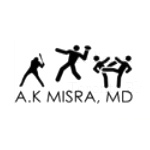Health Tips brought to you by U.S. HealthWorks Medical Group. Our experienced medical experts provide information here that we hope will broaden your healthcare knowledge.
Today we learn more about breast cancer and the importance of screening from Dr. A.K. Misra, medical director for U.S. HealthWorks in South San Francisco. Dr. Misra is also double Board Certified in Sports Medicine and Internal Medicine.
Q: October is Breast Cancer awareness month. Can you speak to some essential points that we as a community need to be aware of?
A: This is a challenging topic to discuss for many people, which is why a specific, proactive effort is being made in society to break down some of the barriers (emotional, among others) to raise awareness about the value in screening. For example, the NFL does a good job using pink in many clever ways throughout the month of October to promote screening with its “A Crucial Catch” initiative. Like colon cancer, breast cancer is one of the few cancers for which there is a screening recommendation (cervical cancer is another example).
The benefit of screening is that if it’s found early enough, potentially lethal, advanced complications of breast cancer (such as premature death) can be averted.
This is one of my favorite websites that I have visited daily for more than 10 years because it raises funds to provide free mammograms to women who could not otherwise afford one. The funds are raised through clicks and site visits, and the associated links available through www.greatergood.com are all for excellent causes. I encourage everyone to visit the site.
Q: Do all women need to be screened for breast cancer?
A: As a broad stroke recommendation, mammograms should start at age 40, and based on the result and other risk factors, one’s personal physician will determine the appropriate interval until the next mammogram. Risk factors can include (and are not limited to) personal and family history of breast cancer, genetic predisposition (such as presence of BRCA I and BRCA II), presence of other female-oriented cancers, tobacco use, race/ethnicity and certain chemical and radiation exposures. This would be a good time to point out that this cancer is not unique to women; while much rarer – it does happen in men, and when it does, it tends to be especially lethal.
While as a general point, mammography is recommended to start at age 40, there are times it is indicated earlier. Further, we recommend that women conduct monthly breast self-checks from an earlier age to get into the routine and be more adept at early detection if something new or unusual appears that may require further evaluation by way of a mammogram and/or ultrasound.
Q: What are some proactive measures people can employ to reduce their likelihood of getting breast cancer?
A: Women can directly reduce their risk for breast cancer by way of exercise. The more exercise someone does, the less their relative risk of breast cancer is, as this is a dose-dependent relationship – 1.25 to 2.5 hours per week of brisk walking reduces a woman’s risk by 18%. Walking 10 hours a week reduces the risk even further. Other risk factors include being obese or overweight. Meat consumption is a risk factor, as it contains Neu5Gc, a sialic acid found in meat products that causes a chronic inflammatory state. Meat/flesh consumption also decreases blood pH. Higher blood pH is protective against cancer and is achieved by centering on a plant-based diet, as shown in this video.
I recommend this website as a nice, easy-to-read summary of breast cancer, which captures the essentials for the more motivated reader as it relates to reducing stress by increasing rest and cutting down other modifiable risk factors.
While a healthy lifestyle is the best way to go not only for breast cancer prevention, but as it relates to all preventable medical problems, the importance of screening cannot be overstated. Early detection is quite literally life-saving, hence the theme of October – Breast Cancer Awareness Month.
(source)






